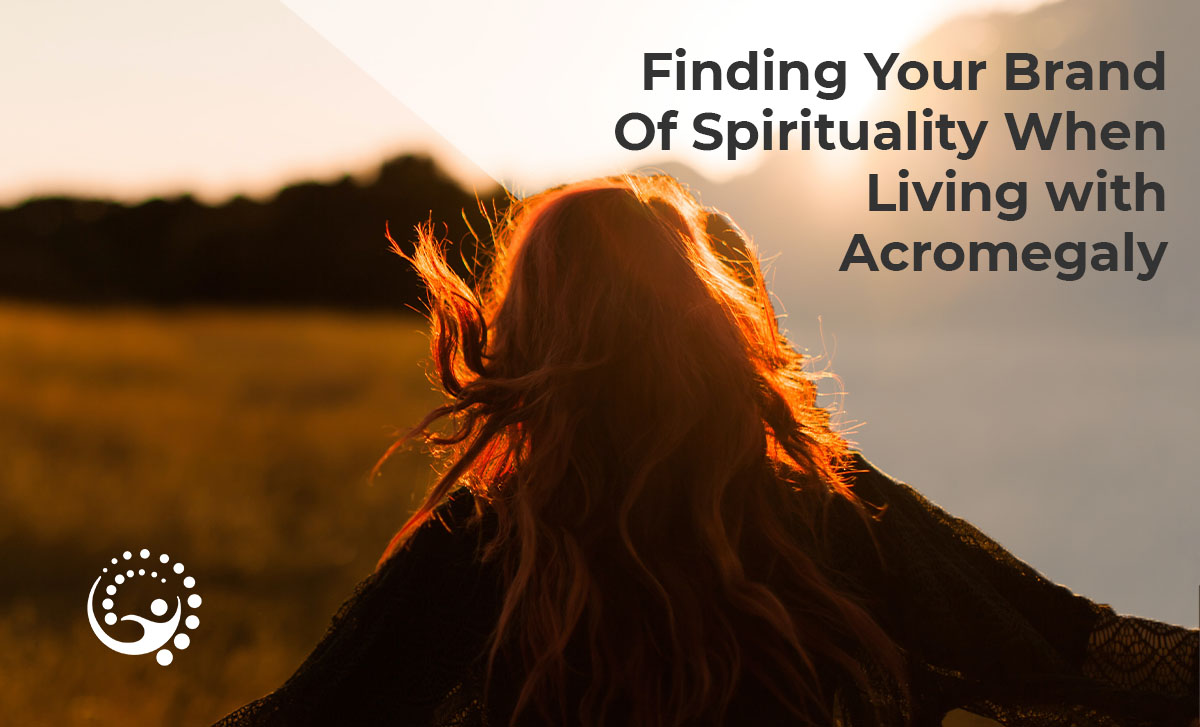In a previous blog post, we talked broadly about the different definitions of spirituality, and how spirituality can enhance your wellbeing, especially when living with a rare disease such as acromegaly. Now, let’s explore some of the different ways you can find your “brand” or personal expression of spirituality. The great thing is that there’s no such thing as the “right” path when it comes to your practice of spirituality—the best path is simply the one that feels right to you.
Pursuing Your Spiritual Journey with Acromegaly
In essence, spirituality refers to a sense of connection to something bigger than yourself, such as the human spirit. However, the ways people experience this can vary widely. For some, attending religious services every week might foster a sense of greater connection, and for others, sitting quietly and watching the sunrise could be a meaningful spiritual practice and a reminder of our relationship with ourselves, others, and the world.
Below are some ideas that may interest you and help you along your spiritual journey.
Explore Religion
One of the more well-known and common ways to practice spirituality is organized religion. Some people derive a great deal of comfort from formal religious practice, and find support through participation in a like-minded religious community. If you’re curious about what options are out there, a simple Google search on world religions can be fruitful.
Commune with Nature
Many people find nature spiritual, and there are hundreds of ways to experience nature depending on your personal preferences. You may establish a connection to the natural world by hiking or walking outside, gardening, camping, or swimming in a natural body of water. Certainly, if you are living with acromegaly, you might have less energy and perhaps want to engage in less-intensive activities such as, going on a picnic or simply lying on the grass and looking up at the sky (or the stars).
If you need more structure (and want to expand your social circle), consider joining a local chapter of one of the dozens of outdoor organizations, including the Sierra Club, The Nature Conservancy, and the World Wildlife Fund.
Journal for Self-Reflection
Articulating your thoughts and emotions about living with acromegaly into words can be cathartic and revelatory, whether on the page or the screen. This practice encourages self-reflection and connects you to your inner voice, desires, and dreams. In fact, lots of research has been done around the health benefits of expressive writing for different populations, including people with chronic diseases and mental illnesses.
Research published in the journal Advances in Psychiatric Treatment found that people who engage in expressive writing can experience long-term improvements, such as greater psychological wellbeing. Expressive writing is when people write for 15 to 20 minutes about the specific traumas or stress in their life. This practice can be incredibly beneficial for someone with acromegaly, for instance, who might be dealing with the loss of their independence or a decrease in their ability to be self-sufficient.
It’s hard to be independent. You have to depend on your family more and they realize they have to be more involved. My parents are never going to get a break from me and you just realize you might not ever attain certain things.
Peter, diagnosed with acromegaly in 2015
If writing about acromegaly doesn’t feel right for you at this time, journaling can also help you boost your creativity and help you set and achieve goals. The author of the iconic book The Artist’s Way, Julia Cameron, is a big advocate of journaling, though she refers to it as “morning pages.” As outlined in this brief video, she has several things to say about the power of this practice. While her framework is built to ramp up one’s creativity, morning pages are also for people with no ambitions to become writers or artists. (Pro tip: If you write morning pages, you will be a writer.) And don’t feel obligated to share your journal—it can be just for you.
Don’t know what to write about? There is a wealth of books and online resources for daily or weekly prompts, such as Poets & Writers.
Discover Meditation
Incorporating meditation—a practice that nurtures awareness of the present—into your life can help you calm your mind and relax your body. Meditation can help deal with mental health issues, which are unfortunately more frequent in people with a rare disease such as acromegaly.
Mindfulness meditation, for instance, focuses on noticing your thoughts as they appear in your mind and then letting them pass through without judgment. Research published in the American Family Physician found that “Mindfulness-based therapies showed large and clinically significant effects on anxiety and depression.”
Don’t worry, it’s not uncommon for people to think meditation is difficult if they find it challenging to clear their minds. Starting small can be helpful. Research suggests that even a five-minute meditation “could be an effective method in decreasing stress.” Popular apps such as Insight Timer and Headspace make meditation accessible and easy to begin.
If meditation sounds beneficial to you, there are many different types of meditation you can try to find one that feels right, such as:
- Focused meditation: Try focusing on something for a set period of time (even two minutes is great!). You could focus on a candle, a picture on your wall, or music in the background.
- Mantra meditation: Repeat a word, phrase, or sound. Having this repetitive sound can help you focus on the moment. Try saying it out loud or in your head, whichever works best.
- Progressive relaxation: This practice is about progressively relaxing your body, one muscle group at a time. Its goal is to develop awareness while also releasing tension.
For more details and inspiration on the different kinds of meditation, check out this resource on progressive relaxation.
Mellow out with Music
Many people have experienced how music can soothe the soul and instantly evoke some of our strongest memories. Among its many benefits, music can also help regulate mood and trigger dopamine, one of the neurotransmitters responsible for creating a sense of pleasure. Music can also help decrease anxiety and manage stress, two critical components of emotional wellbeing, according to a report from the Global Council on Brain Health.
Did you also know that there’s an entire genre of music written specifically to promote and enhance spirituality? This music goes by many names: meditation music, spiritual awakening, positive energy music, spiritual ascension music, or soft, calming music for inner peace. Gregorian chants, instrumental pieces, and Western or Eastern-influenced are all examples of spiritual-centric music. Plus, a recent study published in the Journal of Pain shows that there is evidence that music therapy can help patients deal with chronic pain. So whatever kind of music makes you feel more connected to the universe, indulge your desire to listen to it as often as you like!
Try Volunteering
Performing selfless acts of service that benefit people you don’t know or may never even meet is an incredibly effective way to feel connected to the world and experience spirituality. Of course, living with acromegaly may mean that you are limited to certain types of volunteering because of chronic symptoms; and the pandemic certainly hasn’t made getting out easier. And while that experience is frustrating, consider exploring volunteering options that fit your life as it is now. There are plenty of virtual volunteer options available, such as online tutoring or making calls on behalf of an organization.
Sites like VolunteerMatch can give you ideas of what’s out there. Or Google “volunteer” and the name of your city or county, and you’ll get more search results than you can sift through in one sitting. There are also national and international volunteer opportunities through foundations, charities, religious organizations, and governments. There are even travel programs set up exclusively for people who want to volunteer somewhere in the world
Cultivate Hobbies
Pastimes become favorite ways to spend our time for a reason. When you have a hobby you love, it stirs something within you that other pursuits don’t. It connects you to something larger than yourself. And the beautiful part is that this could mean a thousand different things depending on the person.
Similar to volunteering, your acromegaly symptoms may limit your choices, but they could lead you to new hobbies that are more accessible. Whether it’s yoga, playing with your dog, fishing, reading, or listening to audible books, one of the kindest things you can do for yourself is find the activity that makes you feel alive and dive into it wholeheartedly.
Still not sure what’s your brand of spirituality? We’ve put together a few exercises to help you think through what practices complement your view of spirituality. If you’re feeling inspired and want to learn more about enhancing your spirituality in all aspects of your life, keep an eye out for our next blog. You can also read the full article, “Exploring Spirituality with a Rare Disease: The Universe and You.”
Exercises
Was this information helpful to you? If so, please share with others and subscribe to receive the latest content.
HELPFUL TOOLS AND RESOURCES
Podcast: On Being: Meditation and Mindfulness episodes
Chronic Illness, Spirituality, and Healing: Diverse Disciplinary, Religious, and Cultural Perspectives. Edited by Michael J. Stoltzfus, Rebecca Green, and Darla Schumm.




